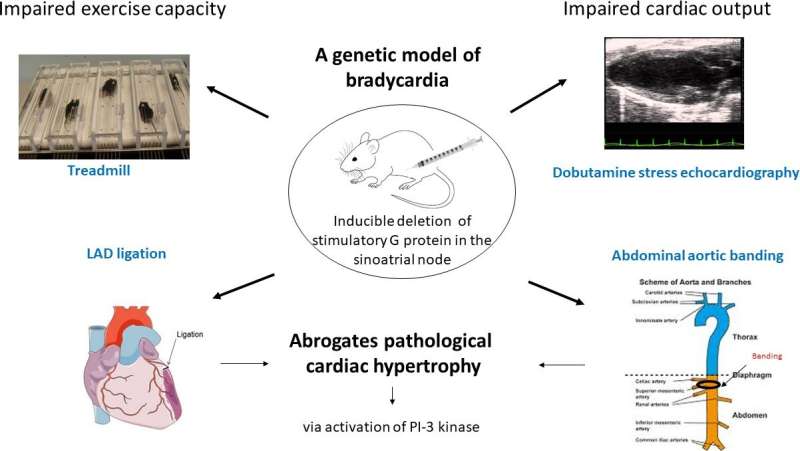Mouse study: Slower heart rate protects against heart enlargement, limits exercise capacity

A new study in mice showed that a slower heart rate may protect against enlargement of the heart, a condition that could become life-threatening if left untreated. The study is published ahead of print in Function.
Previous research has found that sudden cardiac death is more likely in people who have a resting heart rate above 75 beats per minute as compared to those with a resting heart rate under 60. However, it is not clear what drives this association between heart rate and negative outcome.
Researchers looked at a mouse model of heart attack to explore how heart rate reduction affects the heart. The animals lacked heterotrimeric G protein, which is involved in key signaling pathways in the heart. The research team deleted the gene in adult animals using tamoxifen after the heart attack to slow the heart rate.
Echocardiography of the heart showed that the heart rate reduction protected against harmful cardiac hypertrophy. Cardiac hypertrophy, also known as enlargement of the heart, leads to impaired pumping of blood and may also affect electrical function of the heart.
This beneficial effect may be the result of activation of the enzyme phosphoinositide-3 kinase that occurred along with heart rate slowing, the researchers hypothesized. "It is not clear what the upstream mechanism might be, but this would be more easily delineated in future studies," the research team wrote.
The tradeoff for less heart enlargement was a reduced capacity for exercise. When compared to a control group of littermates with typical levels of heterotrimeric G protein, the "lacking" group ran shorter distances at a slower speed during a treadmill test. "The results are consistent with a major adaptive response to exercise, being an increase in heart rate, and loss of this leads to a likely survival disadvantage," the researchers wrote.
"Slowing heart rate protects against pathological cardiac hypertrophy" is published ahead of print in Function.
More information: Sonia Sebastian et al, Slowing heart rate protects against pathological cardiac hypertrophy, Function (2022). DOI: 10.1093/function/zqac055


















